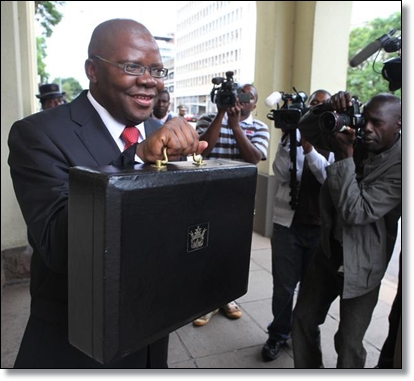Zimbabwe 2012 Budget Statement: A Review

 |
|
Zimbabwe's Finance Minister Tendayi Biti displays the briefcase carrying the National Budget document Photo courtesy |
The major highlight of the budget is the envisaged creation of the 3 year rolling financing strategy for the agricultural sector, a noble and welcome move that will reduce the bottlenecks in farmers accessing inputs. Past input schemes and programmes implemented by Government have been coming well into the agricultural season when it is too late for the farmers to benefit adequately. The finalisation of the securitised lease for A2 farmers by the attorney general’s office is also welcome as the much needed collateral security by the financial institutions will now be available hence making it easier for farmers to secure lines of credit.
The manufacturing sector has been growing in terms of capacity utilisation and is expected to continue on the path of recovery. The economy continues to face current account deficits mainly due to the high importation of finished goods. This is a concern that needs to be addressed and the Minister rightfully alluded to this. A number of lines of credit have been introduced for the sector, the most commendable being the NSSA facility which has reasonable interest rates averaging 10%. The budget also mentions the creation of the Distressed and Marginalised Areas Fund to enhance the capacity of companies facing viability challenges. The creation of the Job Fund is commendable and implementation modalities eagerly awaited. According to the Minister, the fund is meant to provide training in entrepreneurial skills, a move that will augment the Government policy on indigenisation.
The creation of a local credit rating bureau (which has been long overdue) will ensure compliance on credit facilities and reduce the chance of loan defaults. Corporates can then be rated according to their credit worth. The Minister rightfully mentions the need to ensure the availability of small coins as members of the public continue to face difficulties with regard to this aspect. The aspect of small coins is long overdue and it requires Government decisiveness to ensure finality of the matter. The introduction of the fringe benefit tax will most probably face disgruntlement from employees and may not be the best move at the moment especially taking into consideration teachers who have low salaries and have been benefitting immensely from the fringe benefits. However, its enforceability and implementation will remain to be seen.
The aspect of going green which the Minister advocates for in the budget could not have come at a better time as we prepare for the Durban summit later this year. The reality of climatic change can never be undermined and the fact that Government fully embraces this is commendable.
The civil service salaries continue to be unsustainable with the bill constituting 63% of the total budget. Urgent measures need to be implemented to ensure that the bill is within sustainable measures. A balance is required between social considerations that ensure that people’s salaries are above the poverty datum line and the impact of these salaries critically crowding out other competing needs such as capital expenditure. The call for a tripartite forum to discuss this will be crucial.
The allocation of resources for the constitution making process and for elections just further reinforces that the Government of National Unity is nearing its end and elections will definitely be held next year in 2012.
The budget is commendable in its effort to benchmark performance to key declarations namely the Abuja declaration on health, Dakar Framework of 2000 for action on education for all, Maputo declaration of 2003 on agriculture and food security, from the budget it is clear that the Government is well on course to achieving the Dakar framework on education but more needs to be done in terms of achieving the other two benchmarks.
By Tapiwanashe Vushe,
Economist.
tapsvushe@yahoo.co.uk
